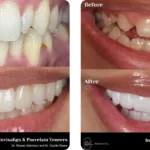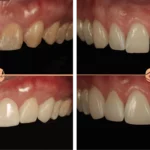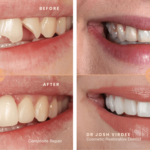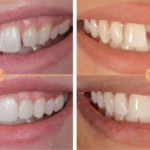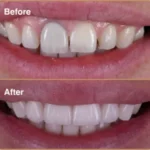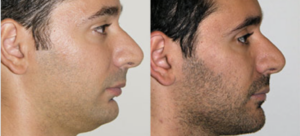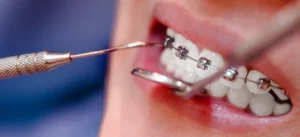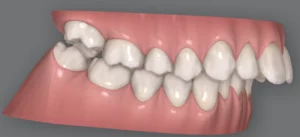Have you ever wondered if the gaps in your teeth can be closed with composite bonding? You’re not alone! Many people looking to restore their smile are curious about what composite bonding can do for them. Let’s take a look at how it works and how it can help restore the appearance of your smile.
What Is Composite Bonding?
Composite bonding is a cosmetic dental procedure that uses tooth-colored materials to fill in small gaps or chips in the teeth. Unlike traditional veneers, composite bonding does not require any part of the tooth to be removed; instead, the material is simply attached (bonded) onto the surface of the affected tooth. The result is a natural-looking restoration that seamlessly blends into your existing smile.
Benefits of Composite Bonding
One of the major benefits of composite bonding is that it does not require much preparation time—in most cases, the entire procedure can be completed in one visit. Additionally, composite bonding tends to be more affordable than other types of cosmetic dentistry procedures such as porcelain veneers or crowns. Finally, because no part of your existing tooth needs to be removed before the procedure begins, there’s no need for anesthesia during treatment. This makes composite bonding an ideal option for those who want to quickly and painlessly enhance their smile without breaking the bank.
Consider the advantages and disadvantages
Long Lasting Results: Composite bonding is incredibly durable and strong. With proper care, it can last up to 5-7 years before needing to be replaced or touched up. Although it’s not as strong as porcelain veneers, it provides a great option for those who are looking for an affordable solution for their dental needs.
Composite bonding doesn’t require much preparation from the dentist, so it can usually be completed in one visit. During the process, your dentist will clean your tooth carefully before applying the composite resin material that matches the color of your tooth enamel. The material is then molded into place and hardened with an ultraviolet light or laser before being polished for a natural look.
Composite bonding is also an affordable solution compared to other types of cosmetic dentistry procedures such as porcelain veneers or porcelain crowns which require more preparation and materials.
Minimally invasive
Composite bonding require no drilling or adjustment of the tooth surface normally and therefore it is a great alternative option compared to porcelain veneers or crowns which need more adjustment
Key Features
- No Drilling of natural tooth structure
- No Injections
- No Pain
- Same Day Results
Advantages:
Easy and simple procedure
This relatively simple procedure has helped countless patients get a beautiful and healthy smile without having to commit to years of braces or other orthodontic treatments like Invisalign.
Composite bonding is a cosmetic dental procedure that involves using composite resin material that is applied directly to the teeth. It can be used to repair chips, cracks, discoloration, gaps, and even misaligned teeth. The resin material used in the procedure matches the color of your natural teeth, so it blends in perfectly with your existing teeth. The process itself only takes one visit and can be completed in a morning or afternoon
One of the main benefits of composite bonding is its affordability when compared to other orthodontic treatments such as braces or porcelain veneers. Furthermore, the process is relatively painless and requires no anesthesia or drilling into your teeth like more invasive procedures such as porcelain veneers or crowns do. Additionally, composite bonding does not require any special care after treatment—just brushing and flossing like normal—which makes it an easy way to maintain your new smile year-round!
Least amount of tooth enamel removed
Outside Tooth Whitening, composite bonding is the least invasive method to improve the colour and overall appearance of your teeth. It is a purely additive process where the tooth coloured material is artistically sculpted and shaped to improve the aesthetics. Compared to alternatives such as porcelain veneers or crowns, composite bonding does not require any enamel to be removed.
Anesthesia is not needed
In addition to being minimally invasive, composite bonding does not require any anesthesia as no drilling of the tooth surface is required. As a result the nerve of the tooth is not disturbed and thus no pain should be felt during this process.
Disadvantages:
Composite bonding is a cosmetic dental procedure used to repair chipped, cracked, or discolored teeth. It involves adhering composite resin to your teeth in order to restore their shape and color. While this procedure can be effective in restoring your smile, it’s important to understand the potential disadvantages before deciding on this treatment.
Not full resistant to stains like crowns
One of the biggest concerns with composite bonding is that it can stain over time. The surface of the resin is porous and can easily absorb food particles and liquids like coffee, tea, and red wine which can cause staining. While professional teeth whitening treatments may be able to get rid of some of the staining, they cannot completely eradicate all of it.
Not as long lasting like other restorative treatments like veneers and crowns
Another disadvantage of composite bonding is that it will wear down over time due to eating habits or oral hygiene practices. This means that you may need to replace the composite material every few years as it can wear away from brushing your teeth and eating hard foods such as nuts or apples. Additionally, if you grind your teeth at night then this will contribute to the wearing down process as well.
Can break or be chipped
Composite bonding does not have the same physical properties as your natural teeth and as a result are less resistant to wear, chipping or breaking. Whilst this can happen it is quite rare, and can be easily fixed. Quite often it can be due to the way the teeth are meeting and the bite, which may need correcting prior to having composite bonding with Invisalign clear braces
Types of teeth that can benefit from composite bonding
Many different types of teeth can benefit from composite bonding including those that have chips, minor fractures, gaps between them, and/or discoloration or staining. This treatment is most commonly used on front teeth since these are the ones visible when you smile; however, it can be used on other types of teeth as well depending on the extent of damage or discoloration present. Your dentist will be able to assess your individual needs and determine if composite bonding is right for you.
Fill in gaps
In situations where the size of the teeth are a lot smaller or different shapes, composite bonding can be used to fill in gaps and adjust the teeth to improve the symmetry. Quite often it can be used in conjunction with Invisalign clear braces which enable the teeth to be moved into the perfect position, which can then be enhanced with composite bonding
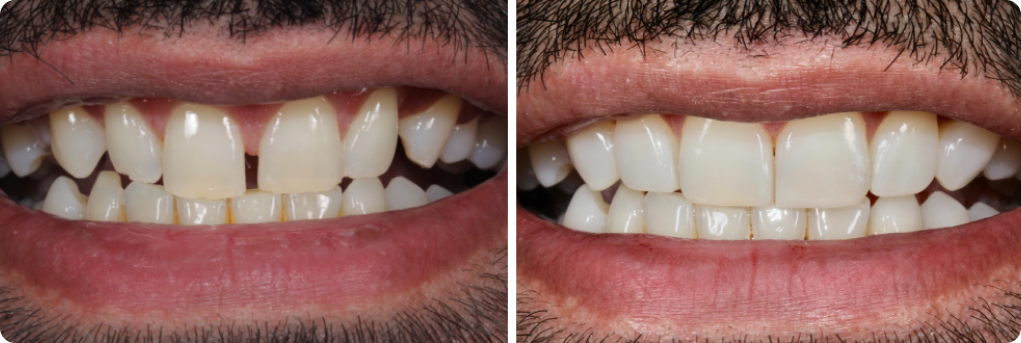
Change shape of teeth
Composite bonding is a great way to restore a beautiful smile without invasive procedures. We can safely and effectively improve the shape of any teeth that may be chipped, misshapen, stained, or gapped. The process is fast and easy, with results that are immediate and often long-lasting.
Protect the root of a tooth
Tooth decay and chips in the enamel can be major problems for our teeth, which can eventually lead to discomfort, discoloration, and even further damage. Fortunately, composite bonding can swiftly and easily repair cracked or chipped teeth. Furthermore, when the root of the tooth is exposed, it can also be applied to protect its surface and also block out the yellow part of the tooth which becomes more noticeable when the gums have receded
This painless procedure involves coating the exposed layer of tooth with a special bonding material that is both strong and aesthetic. Not only does this shore up the exterior of your tooth and give you back your beautiful smile, but it also fully protects the root of your tooth from further decay or damage.
Composite bonding results
Here are some of the composite bonding results that we have achieved
Composite Bonding for discoloured teeth
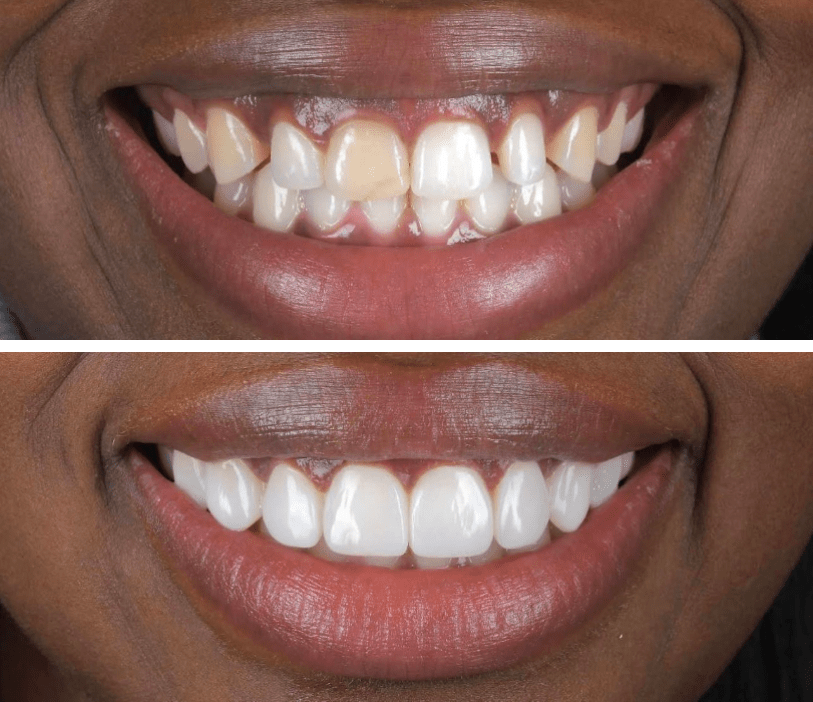
What to avoid to keep your composite bonding lasting longer?
It’s important to remember that composite bonding does not last forever, but there are a few things you can do to maximize its longevity. To keep your composite bonding lasting longer, it is important to avoid some potential risks, such as smoking and consuming staining beverages like tea or coffee. Additionally, be sure to brush your teeth twice a day and floss at least once daily with soft bristles. Avoid grinding or clenching your teeth and make sure to visit the dentist at regular intervals for check-ups.
Smoking
Smoking can cause considerable amounts of staining around the natural teeth. Teeth which have had composite bonding, also are susceptible to the staining effect of smoking. It should therefore be avoided wherever possible. Other alternative solutions such as porcelain veneers or crowns will stain significantly less.
Teeth staining beverages
The same will apply to tea and coffee and should ideally be consumed with a straw or avoided if possible if composite bonding has been carried out. Regular maintenance at least once a year can help remove the staining
How Ruh Dental can help you in your journey for better teeth?
There are many people who wish their smile could look better, which can negatively affect confidence. At Ruh Dental, we provide cosmetic dental treatments to help align, enhance and even replace teeth. This can can help those achieve the smile of their dreams, inspiring confidence, health and overall well being.








